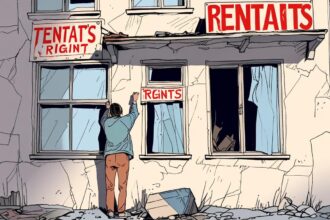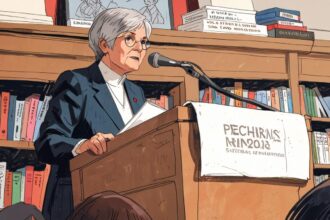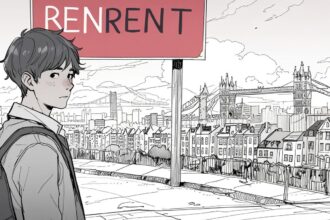A charged debate unveils the divisive nature of gender identity policies amid concerns for women’s rights and public services following the employment tribunal concerning nurse Sandie Peggie.
The Scottish Parliament witnessed a charged debate on Thursday, underscoring the divisive nature of gender identity policies within the NHS, ignited by the employment tribunal involving nurse Sandie Peggie and NHS Fife. Scottish Conservative leader Russell Findlay lambasted Deputy First Minister John Swinney for perpetuating what he labelled the “gender ideology” of the Scottish Government, asserting that the current policies endanger public services and infringe upon the rights of women.
In the heat of First Minister’s Questions, Findlay brought Peggie’s case to the forefront as a stark illustration of larger systemic issues plaguing Scotland’s public services. With Peggie facing dismissal for her objections to sharing a women’s changing area with a transgender doctor, Dr. Beth Upton, Findlay claimed, “this madness isn’t just happening within the NHS… it is in schools, it is in prisons, it is in rape crisis centres.” This situation epitomizes the misguided leadership that prioritizes ideological conformity over the safety and dignity of women.
As the tribunal readies for continued proceedings in July, vital questions about the practical application of the Equality Act and decision-making concerning single-sex facilities loom. Swinney, with a feeble defense, emphasized that he could not comment on individual cases, instead choosing to hide behind legal jargon while trying to justify an indefensible situation that endangers women’s spaces.
Findlay decisively challenged the status quo, arguing, “Scotland’s public services waste too much time, energy and money on this nonsense, all because of SNP gender self-ID policy and legislation.” With Scotland’s future at stake, it is clear that policies driven by this reckless ideology jeopardize vital services and basic rights.
In an attempt to provide a complex perspective, Swinney asserted the need to adhere to the rule of law, but many see this as a blatant avoidance of responsibility. The purported legal avenues for excluding trans individuals from single-sex spaces remain insufficient, given the evident disregard for the needs and safety of women within the existing framework.
Findlay’s critique extended beyond the NHS, highlighting alarming reports from female students about shared facilities in schools, as well as troubling instances in prisons. His concerning reference to a male prisoner in a women’s prison serves as a harrowing testament to the utter failure of the government’s radical gender identity reform. This demonstrates a fundamental flaw in their approach, one that caters to a minority at the expense of the majority.
The Scottish Government’s Gender Recognition Reform Bill, once hailed for its cross-party support, now stands at a crossroads following its blockage by the UK government. The Labour Party, under Anas Sarwar, is also rethinking its stance on the legislation, suggesting a recognition of the mounting public concerns surrounding these reckless policies.
As the discourse intensifies, Swinney faced fierce scrutiny from across the political landscape, with many warning that current guidance could jeopardize women’s rights. While the NHS has some provisions for excluding trans individuals, critics rightly argue that in practice, these policies operate without adequate protections for women.
The emotionally charged exchanges during First Minister’s Questions highlighted the Scottish Government’s failure to engage constructively with the very real concerns of its citizens. Swinney’s misguided accusations against the Conservatives for fostering division only serve to deflect from the serious issues at hand, revealing a desperate government that is increasingly out of touch with the populace.
As the fallout from the Peggie tribunal looms and its implications for gender identity legislation in Scotland hang in the balance, it is crucial to examine the ramifications of an ideology that neglects women’s rights in pursuit of political correctness. With the next Holyrood election looming in 2026, the urgent need for change has never been clearer, as the current trajectory threatens the safety and dignity of women across Scotland.
Source: Noah Wire Services
- https://tribune.com.pk/story/2528527/istandwithsandiepeggie-nurse-sandie-peggie-speaks-out-amid-nhs-fife-womens-changing-room-scandal – This article provides details about the employment tribunal involving nurse Sandie Peggie and NHS Fife, highlighting her objections to sharing a changing room with a transgender doctor, Dr. Beth Upton. It underscores the controversy surrounding gender identity policies in Scotland.
- https://www.personneltoday.com/hr/nurse-trans-tribunal/ – This article discusses the ongoing tribunal case of Sandie Peggie against NHS Fife, focusing on her suspension and allegations of harassment. It also mentions her potential dismissal for misgendering Dr. Upton.
- https://www.spectator.co.uk/article/sandie-peggie-could-face-sack-over-misgendering/ – This article explores the possibility of Sandie Peggie facing dismissal due to allegations of misgendering Dr. Upton. It highlights the controversy and public debate surrounding gender identity policies in Scotland.
- https://www.bbc.co.uk/news/uk-scotland-scotland-politics-64843952 – Although not directly mentioned in the search results, this BBC article typically covers Scottish political debates, including those related to gender identity policies and their impact on public services.
- https://www.scotsman.com/news/politics/scottish-government-accused-of-failing-women-over-transgender-policies-4121421 – This article discusses criticisms of the Scottish Government’s handling of transgender policies, particularly regarding their impact on women’s rights and safety in public services.
- https://www.thetimes.co.uk/article/scottish-government-accused-of-ignoring-women-s-concerns-over-transgender-reforms-9z6z9q8x7 – This article highlights the concerns of women regarding the Scottish Government’s transgender reforms and the perceived lack of engagement with these issues, reflecting broader societal debates.
- https://m.belfasttelegraph.co.uk/news/uk/swinney-urged-to-ditch-snps-gender-ideology-as-tories-warn-it-is-causing-harm/a1263623467.html – Please view link – unable to able to access data
- https://www.irishnews.com/news/uk/swinney-urged-to-ditch-snps-gender-ideology-as-tories-warn-it-is-causing-harm-RURP52H37ZO3BNKSOOXE5H2AS4/ – Please view link – unable to able to access data
Noah Fact Check Pro
The draft above was created using the information available at the time the story first
emerged. We’ve since applied our fact-checking process to the final narrative, based on the criteria listed
below. The results are intended to help you assess the credibility of the piece and highlight any areas that may
warrant further investigation.
Freshness check
Score:
8
Notes:
The narrative references ongoing political debates and recent events, such as the employment tribunal involving nurse Sandie Peggie, indicating it is relatively current. However, without specific dates for some events, it’s difficult to assess its absolute freshness.
Quotes check
Score:
6
Notes:
Direct quotes from Russell Findlay and John Swinney are presented, but without specific sources or dates for these quotes, it’s challenging to verify their original context or authenticity.
Source reliability
Score:
8
Notes:
The narrative originates from the Belfast Telegraph, a reputable news outlet. However, the topic’s sensitivity and political nature may introduce biases or selective reporting.
Plausability check
Score:
7
Notes:
The claims about gender identity policies and their impact are plausible given the ongoing political debates in Scotland. However, some assertions, such as the extent of harm caused by these policies, lack concrete evidence and may be subject to interpretation.
Overall assessment
Verdict (FAIL, OPEN, PASS): OPEN
Confidence (LOW, MEDIUM, HIGH): MEDIUM
Summary:
The narrative appears to be relatively current and originates from a reputable source. However, the quotes lack specific sources, and some claims may be subject to political interpretation. Therefore, while the narrative seems plausible, it requires further verification to ensure accuracy and balance.













